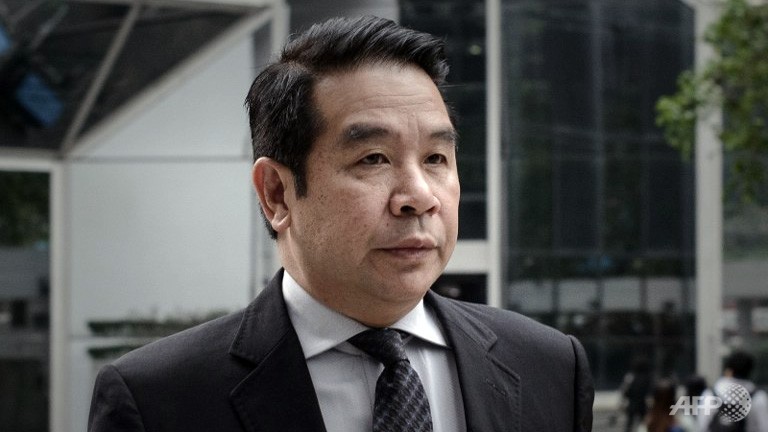Birmingham City owner Carson Yeung guilty of money laundering

Birmingham City owner Carson Yeung arriving at the Wanchai district court in Hong Kong. (AFP/Philippe Lopez)
HONG KONG: A Hong Kong court on Monday found Birmingham City owner Carson Yeung guilty of five counts of money-laundering, completing the former hairdresser's fall from grace since taking over the club in 2009.
The 54-year-old businessman had denied laundering HK$720 million (US$93 million) between 2001 and 2007, and repeatedly tried to halt proceedings over the course of the trial, claiming irregularities.
Judge Douglas Yau criticised Yeung's "self-contradictory" testimony and said he was "making it up as he went along", in comments at a district court packed with reporters and members of the public.
"I find that he is someone who is prepared to, and did try to, lie whenever he saw the need to do so," the judge said.
The tycoon, wearing a dark suit, appeared calm as the verdict was read out. He was remanded in custody and will be sentenced on Friday, and could face a maximum of seven years in jail.
Yeung was arrested and charged with ill-gotten gains in the southern Chinese city in June 2011, two years after he acquired the "Blues".
Little-known prior to his emergence in English football, he took control of the club in October 2009 in an 81 million pound (US$130 million) takeover.
In February Yeung resigned as chairman and executive director of Birmingham International Holdings Limited (BIHL), which owns the struggling second-tier club, but is still its largest shareholder.
Throughout the trial, Yeung and the prosecution have painted differing pictures of how the businessman's wealth was amassed.
Yau pointed to HK$347.31 million deposited in just one of Yeung's accounts between 2001 and 2007, of which HK$27.9 million was done so purely in cash.
The businessman was aware that cash transactions would make the money more difficult to trace, he said.
Amounts subsequently withdrawn from Yeung's bank accounts mirrored the size of deposits, he said, showing that they were used as a "repository of funds".
And Yau said there were reasonable grounds to believe that multiple business dealings with which Yeung was involved had made use of funds which represented "proceeds of an indictable offence".
The prosecution had claimed during the trial the HK$720 million that passed through the five accounts had come from "unknown parties without any apparent reason".
The sum, they said, was "more than 300 times the total combined salary" of Yeung and his father.
Yeung's father's name was included in two of the charges, though he died in 2012.
Yeung maintained he accumulated hundreds of millions of dollars through stock trading, hairdressing, business ventures in mainland China and a keen interest in gambling, much of it before the alleged offences took place.
He said he made HK$20 million as a hairdresser between 1989 to 1994, when he ran five upmarket hair salons in hotels, including Hong Kong's five-star Peninsula Hotel.
He also said he spent "all" of his time trading stocks after the 1998 Asian stock market crash, accumulating a stock portfolio of around HK$300 million by 2007.
Yeung also told the court he made up to HK$30 million from gambling in Macau between 2004 and 2008, adding that he gambled as if he were "running a business".
But the prosecution said Yeung earned around HK$335,000 from his hair salons, while his father made only a tiny profit from a vegetable stall he ran from the public housing estate where he lived, between 1997 and 1999.
Yeung, whose Cantonese name is Yeung Ka-sing, emerged in 2007 with a bid for Birmingham. The takeover attempt failed when he missed the deadline to hand over money.
He quietly acquired a 29.9-percent stake and in 2009, Yeung's Grandtop International Holdings -- which later became BIHL -- bought the club from David Sullivan and David Gold, now owners of West Ham.
In a statement following the verdict, the Football League said that it did not require "any financial assurances beyond this point".
"The League has been working with the club during this period and, based on the information provided, is satisfied that Birmingham City complies with its requirements regarding ownership, as well as having funding arrangements in place until the end of the 2013/14 season, at least," it said.
Birmingham City fans were likely to celebrate the verdict, said Daniel Ivery, a Birmingham-based football blogger and author of an upcoming book about Yeung.
"I think a large majority of Birmingham City fans will be very happy about this because a lot of them see Carson as destroying the football club," he told reporters after the verdict.
"Waking up to Carson being guilty, what a brilliant way to start a Monday!" Birmingham season ticket holder @hannah_bcfc wrote in a Twitter post.
What the stars mean:
★ Poor ★ ★ Promising ★★★ Good ★★★★ Very good ★★★★★ Exceptional
Latest News
More News
- Muong Thanh Golf Club marks five years with flagship golf tournament (October 01, 2025 | 18:25)
- TCP Vietnam opens new youth sports yard in Danang (September 22, 2025 | 18:46)
- 'Run For The Heart' to return to Ho Chi Minh City this September (August 29, 2025 | 15:31)
- LION Championship 25 to feature title showdowns in Khanh Hoa (August 15, 2025 | 14:24)
- AFF Women’s Championship 2025: Vietnam defeat Thailand in tense showdown (August 15, 2025 | 14:21)
- Hung Yen win National U11 Football Championship – Nestlé MILO Cup 2025 (August 06, 2025 | 11:34)
- Vietnam win third consecutive ASEAN U-23 title (July 30, 2025 | 07:00)
- Game-changing tech and startups to star at Vietnam Sport Show (July 18, 2025 | 14:56)
- Vietnam women's team secure 6-0 victory over UAE in Asian Cup qualifiers (July 04, 2025 | 15:32)
- Herbalife Vietnam supports VnExpress Marathon Quy Nhon 2025 (June 17, 2025 | 17:38)
















 Mobile Version
Mobile Version